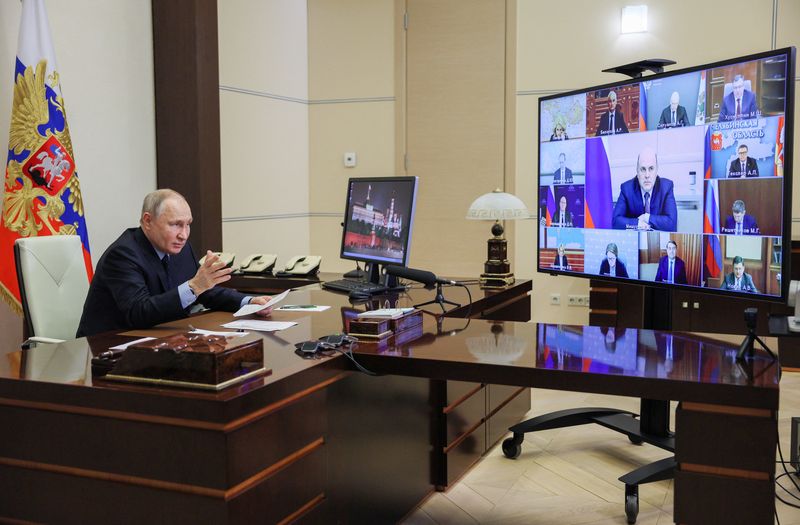By Darya Korsunskaya and Alexander Marrow
MOSCOW (Reuters) -Russia's federal budget balance sank to a deficit of 2.4 trillion roubles ($29 billion) in the first quarter of the year as Moscow spent heavily and energy revenues fell, the finance ministry said on Friday.
In the same quarter of 2022 Russia posted a surplus of 1.13 trillion roubles, but since then significant outlays to support its military campaign in Ukraine and a wall of Western sanctions on its oil and gas exports have hit government coffers.
The finance ministry stopped publishing monthly budget fulfilment data last year. But based on Friday's figures, Russia posted a surplus in March of 181 billion roubles, improving on deficits of 821 billion roubles in February and 1.76 trillion roubles in January.
Spending accelerated 34% in the quarter to 8.1 trillion roubles, the preliminary data showed. Rising military production and huge state spending have helped keep industry buzzing and softened the economic impact of the campaign in Ukraine and of Western sanctions.
In March spending growth slowed, however, rising 4.2% year-on-year compared with the 33.9% jump in February.
Overall government income was down 20.8% in the quarter compared with 2022 at 5.7 trillion roubles, led by a 45% dive in energy revenues to 1.64 trillion roubles, the data showed.
Moscow relies on income from oil and gas to fund its budget and has been forced to start selling international reserves to help cover the deficit. Since the West imposed a price cap on Russian oil late last year the rouble has also tumbled, and on Friday it suffered its biggest intraday fall of the year.
2% TARGET
Russia says its 2023 deficit will not exceed 2% of GDP.
Many analysts think it will exceed that.
Elina Ribakova, a Senior Fellow at Bruegel and the Peterson Institute for International Economics, said the deficit will be closer to 4% or 5% of GDP, with Russia's finance technocrats the main obstacle to an even wider gap from opening up.
"To me the most important indicator as to whether there will be a manageable deficit is whether we will see personnel changes in the ministry of finance or the central bank," she said.
"As long as that technocratic bloc is there, I think they will lean against producing a deficit about 6%," she said.
Dmitry Polevoy, head of investment at Locko-Invest, forecasts a 2023 deficit of 3%-3.5% of GDP, which he said would require an increase in government borrowing to 4 trillion roubles.
Russia's plan currently envisages debt issuance through OFZ treasury bonds of 2.5 trillion roubles, with another 1 trillion in borrowing permitted to replace spending from the National Wealth Fund.
The widening deficit means the corporate tax burden is very likely to rise in coming years, said Alfa Bank Chief Economist Natalia Orlova.
"The large budget deficit...increases nervousness on the market in relation to the price that geopolitical tensions are costing, and requires efforts directed at improving budget revenues," she said.

The central bank has repeatedly warned that the budget deficit poses inflationary risks and may compel it to raise interest rates from the current 7.5%. It next sets interest rates on April 28.
($1 = 82.9500 roubles)